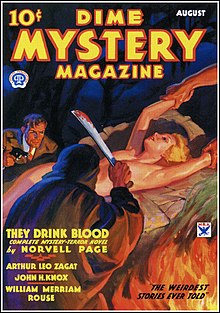Portal:Speculative fiction

Speculative fiction is an umbrella phrase encompassing the more fantastical fiction genres, specifically science fiction, fantasy, horror, supernatural fiction, superhero fiction, utopian and dystopian fiction, apocalyptic and post-apocalyptic fiction, and alternate history in literature as well as related static, motion, and virtual arts. It has been around since humans began to speak. The earliest forms of speculative fiction were likely mythological tales told around the campfire. Speculative fiction deals with the "What if?" scenarios imagined by dreamers and thinkers worldwide. Journeys to other worlds through the vast reaches of distant space; magical quests to free worlds enslaved by terrible beings; malevolent supernatural powers seeking to increase their spheres of influence across multiple dimensions and times; all of these fall into the realm of speculative fiction. Speculative fiction as a category ranges from ancient works to cutting edge, paradigm-changing, and neotraditional works of the 21st century. It can be recognized in works whose authors' intentions or the social contexts of the versions of stories they portrayed is now known. For example, Ancient Greek dramatists such as Euripides, whose play Medea (play) seemed to have offended Athenian audiences when he fictionally speculated that shamaness Medea killed her own children instead of their being killed by other Corinthians after her departure. The play Hippolytus, narratively introduced by Aphrodite, is suspected to have displeased contemporary audiences of the day because it portrayed Phaedra as too lusty. In historiography, what is now called speculative fiction has previously been termed "historical invention", "historical fiction," and other similar names. It is extensively noted in the literary criticism of the works of William Shakespeare when he co-locates Athenian Duke Theseus and Amazonian Queen Hippolyta, English fairy Puck, and Roman god Cupid all together in the fairyland of its Merovingian Germanic sovereign Oberon in A Midsummer Night's Dream. In mythography it has been termed "mythopoesis" or mythopoeia, "fictional speculation", the creative design and generation of lore, regarding such works as J. R. R. Tolkien's The Lord of the Rings. Such supernatural, alternate history, and sexuality themes continue in works produced within the modern speculative fiction genre. Jump to a specific section belowSelected profileLarry Correia (/kəˈriː.ə/; born 1977) is an American fantasy and science fiction writer, known for his Monster Hunter International, Grimnoir Chronicles, and Saga of the Forgotten Warrior series. He has authored or co-authored over 25 novels, has over 50 published short works, two collections of stories, and has co-edited three published anthologies. He was nominated for the John W. Campbell Award for Best New Writer in 2011, and his works have been nominated for the Audie Award multiple times, winning twice. He has won the Dragon Award for Best Military Science Fiction or Best Fantasy Novel four times. In 2014, Correia started the Sad Puppies campaign to nominate works for the Hugo Award, including his own, that he claimed were more popular but often unfairly passed over in favor of more literary works or stories with progressive political themes. (Full article...)Selected workZork is a text adventure game first released in 1977 by developers Tim Anderson, Marc Blank, Bruce Daniels, and Dave Lebling for the PDP-10 mainframe computer. The original developers and others, as the company Infocom, expanded and split the game into three titles—Zork I: The Great Underground Empire, Zork II: The Wizard of Frobozz, and Zork III: The Dungeon Master—which were released commercially for a range of personal computers beginning in 1980. In Zork, the player explores the abandoned Great Underground Empire in search of treasure. The player moves between the game's hundreds of locations and interacts with objects by typing commands in natural language that the game interprets. The program acts as a narrator, describing the player's location and the results of the player's commands. It has been described as the most famous piece of interactive fiction.
The original game, developed between 1977 and 1979 at the Massachusetts Institute of Technology (MIT), was inspired by Colossal Cave Adventure (1976), the first well-known example of interactive fiction and the first well-known adventure game. The developers wanted to make a similar game that was able to understand more complicated sentences than Adventure's two-word commands. In 1979, they founded Infocom with several other colleagues at the MIT computer center. Blank and Joel Berez created a way to run a smaller portion of Zork on several brands of microcomputer, letting them commercialize the game as Infocom's first products. The first episode was published by Personal Software in 1980, after which Infocom purchased back the rights and self-published all three episodes beginning in late 1981. (Full article...) Selected quote
—T. O'Conor Sloane (1851–1940), "Discussions" Amazing Stories (January 1927). This quote is notable for being the first "modern use" of the term science fiction.[1]
Selected picture An illustration by Kate Greenaway that accompanied Robert Browning's version of the Pied Piper of Hamelin, a legend wherein a piper is hired by the town of Hamelin, Germany, to lead rats away with his magic pipe. The town refuses to pay his wages and he retaliates by leading the children of the town away as well. (POTD) Did you know...
Upcoming conventionsJune:
July:
Dates can usually be found on the article page. See also these convention lists: anime, comic book, furry, gaming, multigenre, and science fiction. Selected article Dime Mystery Magazine was an American pulp magazine published from 1932 to 1950 by Popular Publications. Titled Dime Mystery Book Magazine during its first nine months, it contained ordinary mystery stories, including a full-length novel in each issue, but it was competing with Detective Novels Magazine and Detective Classics, two established magazines from a rival publisher, and failed to sell well. With the October 1933 issue the editorial policy changed, and it began publishing horror stories. Under the new policy, each story's protagonist had to struggle against something that appeared to be supernatural, but would eventually be revealed to have an everyday explanation. The new genre became known as "weird menace" fiction; the publisher, Harry Steeger, was inspired to create the new policy by the gory dramatizations he had seen at the Grand Guignol theater in Paris. Stories based on supernatural events were rare in Dime Mystery, but did occasionally appear. Popular Publications soon started more magazines in the same genre, and weird menace magazines began to appear from other publishers as well. In 1937 the emphasis on sex and sadism in Dime Mystery's stories increased, but in 1938 the editorial policy switched back to detective stories. These stories now focused on detectives with some unusual handicap such as amnesia or hemophilia. There was a brief return to weird menace stories, after which more ordinary detective stories filled the magazine until it ceased publication in 1950. Most of the stories in Dime Mystery were considered low-quality pulp fiction by critics, but some well-known authors also appeared in the magazine, including Edgar Wallace, Ray Bradbury, Norvell Page, and Wyatt Blassingame. The last few issues appeared under the title 15 Mystery Stories. (Full article...)On this day...Book releases
Anniversaries and events
Possible futuresPossible events in the future as suggested by science fiction:
Things you can do...Here are ideas for how you can help improve the coverage of speculative fiction topics on Wikipedia: Join a WikiProject or task force:
Start a requested article:
Expand a stub: Expand a new article:
Note: If no articles are shown below, please work on those found in the Archive. This list was generated from these rules. Questions and feedback are always welcome! The search is being run daily with the most recent ~14 days of results. Note: Some articles may not be relevant to this project. Rules | Match log | Results page (for watching) | Last updated: 2024-05-31 22:27 (UTC) Note: The list display can now be customized by each user. See List display personalization for details.
Recognized contentFeatured articles are considered to be the best on Wikipedia, as determined by Wikipedia's editors, and Good articles are those which are considered to be of good quality but which are not yet featured article quality. If you see one that should be listed here, please add it or post on the talk page and let us know so we can add it for you. Speculative fiction topicsCreators: Artists (list) · Authors (by nationality) · Editors Fantasy
Creators: Artists · Authors Horror
Creators: Artists · Authors SubcategoriesRelated portalsWikimediaThe following Wikimedia Foundation sister projects provide more on this subject:
Associated content
Science fiction The following Wikimedia Foundation sister projects provide more on this subject:
Fantasy The following Wikimedia Foundation sister projects provide more on this subject:
Horror The following Wikimedia Foundation sister projects provide more on this subject:
Portal directory |


























